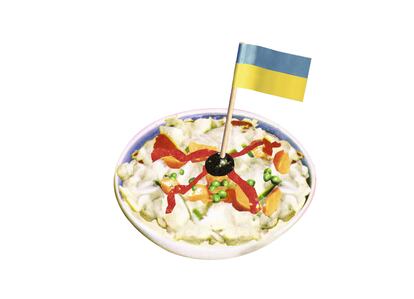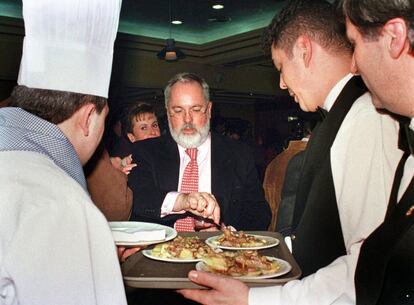The salad days of the culture war: Which foods are leftist and which are right-wing?
Modern wars do not distinguish between the front line and the rearguard. As the battlefield stretches from Ukraine to Twitter, food has become susceptible to ideologization

Jesús Contreras tells the story of the first time he traveled to Peru, “many, many years ago,” he notes, and was served brown sugar with his coffee. “The professor I was accompanying looked at me and said: ‘This is typical of third-world societies.” In recounting the anecdote Contreras, a professor of food anthropology, is attempting to explain that what the ideologization of food is really centered on is the society in which we live. In the 1980s, when Spain was striving for modernity above all else, white sugar was sought-after: a purified, processed, manufactured product. “But today we don’t know what we are eating,” he says. “That is why natural produce, recently harvested and unmanipulated, is so valued. In principle, foodstuffs do not carry any ideology, that is obvious, but they can be converted into a symbol.”
As such, perhaps it is more accurate to say that we eat what we are, rather than we are what we eat. As an example, over the course of 2022 someone with a very rightist political sympathy will eat more steaks that ever before, in support of the livestock industry. If someone argues that it is one of the biggest greenhouse gas-producing industries on the planet, the carnivore will retort that is an invention propagated by globalist progressives who want to push the sustainable development goals of the UN’s 2030 Agenda while they order a coffee and a pastry. In the same way, panela and sourdough bread with crushed avocado are considered food for mellifluous urbanites.
Following the same line of argument, it has to be supposed that the 326,000 votes received by the Animalist Party Against Mistreatment of Animals (PACMA) in the 2019 congressional elections in Spain were cast by vegans. “But not all vegans are animalists,” notes Contreras. “Many of these movements are transversal. Ideologizing a dietary `preference is a way of discrediting it.”
Russian salad, a popular dish in Spain, became ideologized when it was rebaptized Kiev salad, as a declaration of intent after the invasion of Ukraine by Russia. If it is on the menu as Kiev salad in a restaurant, it is not necessary to hang a Ukrainian flag over the door to know which side of the war the chef is on. It is not the first time that Russian salad, which was invented in the 19th century by a Belgian chef, has been subject to a rebranding. During the Franco regime in Spain, it was renamed National salad or Imperial salad. And it is far from the only dish that has been through some nomenclature-based ups and downs. In 2003, France declined an invitation from the United States to join the Coalition of the willing that would invade Iraq. The three restaurants inside the US Capitol building in Washington, DC, decided to rebrand French fries in a more patriotic way, introducing the world to freedom fries. “It is a small but symbolic demonstration of how disgusted we are with the French, who claim to be our allies,” said a Republican congressman at the time. The French Embassy in the United States merely stated that, in fact, French fries were a Belgian invention.

It can also prove to be a double-edged sword. During the two World Wars, German soldiers were commonly known as Krauts, a derogatory term stemming from sauerkraut, the traditional German dish consisting of sour cabbage. But in the late 1960s and early 1970s, experimental rock groups in West Germany adopted the term with pride to give birth to the krautrock movement, and to differentiate themselves from what Anglo-Saxon bands were doing. To date, it remains the only musical movement named after a vegetable.

“The symbolization of food takes place at a given time and in a specific context,” says Contreras. And it is not always a negative one, the professor stresses. “The most symbolized foodstuff at a global level is salt. It is a preservative that prevents food going off and in Japan, Guatemala, Africa and parts of Europe it represents purity, friendship, spirituality and the fight against evil.”
It is an example of the virtues of a nutrient being imbued with symbolic meaning. But whether or not a foodstuff possesses nutritional values or defects is of little matter when it comes to ideologizing it. Now-defenestrated Spanish conservative leader Pablo Casado felt obliged to defend beet sugar during an election campaign in the agricultural region of Castilla y León. “Sugar beet has been under attack. The difficult years it has been through, only for people to now say that sugar is poison,” the former Popular Party leader said. Because as everyone knows, to paraphrase Martin Niemöller, first they came for the sugar beet, but I did not speak out - because I was not a sugar beet…
Tu suscripción se está usando en otro dispositivo
¿Quieres añadir otro usuario a tu suscripción?
Si continúas leyendo en este dispositivo, no se podrá leer en el otro.
FlechaTu suscripción se está usando en otro dispositivo y solo puedes acceder a EL PAÍS desde un dispositivo a la vez.
Si quieres compartir tu cuenta, cambia tu suscripción a la modalidad Premium, así podrás añadir otro usuario. Cada uno accederá con su propia cuenta de email, lo que os permitirá personalizar vuestra experiencia en EL PAÍS.
¿Tienes una suscripción de empresa? Accede aquí para contratar más cuentas.
En el caso de no saber quién está usando tu cuenta, te recomendamos cambiar tu contraseña aquí.
Si decides continuar compartiendo tu cuenta, este mensaje se mostrará en tu dispositivo y en el de la otra persona que está usando tu cuenta de forma indefinida, afectando a tu experiencia de lectura. Puedes consultar aquí los términos y condiciones de la suscripción digital.








































